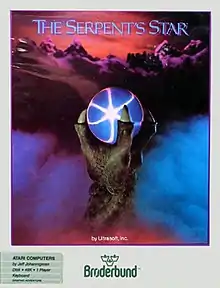| The Serpent's Star | |
|---|---|
 | |
| Developer(s) | Ultrasoft |
| Publisher(s) | Broderbund |
| Programmer(s) | Atari 8-bit Jeff Johannigman[1] Commodore 64 Scott Shumway[2] |
| Platform(s) | Apple II, Atari 8-bit, Commodore 64 |
| Release | 1983: Apple 1984: Atari[1] 1985: C64[2] |
| Genre(s) | Interactive fiction |
| Mode(s) | Single-player |
The Serpent's Star is an interactive fiction game with graphics. It was developed by Ultrasoft and published by Broderbund for the Apple II in 1983 as the sequel to The Mask of the Sun.[3] Ports to the Atari 8-bit family (1984) and Commodore 64 (1985) followed.
Gameplay

The game takes place in Tibet. The player named Mac Steele is an archaeologist, who tries to find a valuable diamond called "The Serpent's Star". He needs 13 scrolls, which provide advice to the diamond's hideout in the town of Kara-Koram. Therefore, Mac Steele has to travel through Tibet, to solve a lot of puzzles and to meet other non-player characters, e.g. Buddhist monks.[4]
The single-player adventure is controlled via typed keyboard commands. Words and simple sentences are entered in a text parser.[5]
Reception
Softline stated, "if you liked Mask of the Sun, you'll probably like Serpent's Star. Most of us did".[6] Antic called it "a good, challenging game".[7] A reviewer for German magazine Happy Computer praised the thrilling, atmospheric storyline, the complexity of the riddles, and the graphics.[8]
References
- 1 2 "The Serpent's Star". Atarimania.
- 1 2 "The Serpent's Star". Gamebase 64.
- ↑ The Serpent's Star at Adventureland by Hans Persson and Stefan Meier
- ↑ Michael Ciraclo: Serpent's Star, Antic Amiga Magazine, Vol. 3 Nr.12, 4/1985, p.80; Heinrich Lenhardt: Der Drachenstern, Happy Computer 4/1985, p.142f. (German)
- ↑ Heinrich Lenhardt: Der Drachenstern, Happy Computer 4/1985, p.142f. (german)
- ↑ Tommervik, Margot Comstock (May–Jun 1983). "Serpent's Star". Softline. p. 44. Retrieved 28 July 2014.
- ↑ Michael Ciraclo: Serpent´s Star, Antic, Vol. 3 Nr.12, 4/1985, p.80.
- ↑ Heinrich Lenhardt: Der Drachenstern, Happy Computer 4/1985, p.142f. (German)
External links